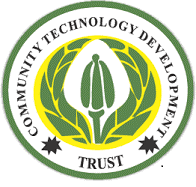Community Technology Development Trust Ecological Farming and Small-Scale Mechanisation Project
Job Description
Project No: A-ZWE-2021-0203
Country: Zimbabwe
End of Project Evaluation
TERMS OF REFERENCE (TORs)
2024
1. Executive Summary
CTDT is actively seeking the expertise of experienced consultant based in Zimbabwe to conduct an in-depth end of project evaluation for the Ecological Farming and Small-Scale
Mechanisation (EFASS) Project. The project aims to contribute to the development of
resilient agricultural production systems, improved food, nutrition and income security in the face of climate change through promotion of ecological farming, traditional grain production, processing and marketing and wider adoption of small-scale mechanization
among smallholder farmers in Mashonaland East. The project is being implemented by CTDT in three districts namely Murewa, UMP and Mudzi. The main responsibility of the consultant will be to carry out an extensive and comprehensive survey to determine the impact of the EFASS Project with particular emphasis on the potential of small-scale mechanization. In
addition, the consultant is expected to evaluate how the project has promoted the adoption of traditional grains production, agro-ecology, innovation, rural development, social inclusion and capacity of farmer associations. This evaluation will help to inform future programming and interventions towards exploring available options for scaling up
mechanization and the designing of affordable model which is socially inclusive and sustainable.
2. About the Organization
CTDT is a Zimbabwean registered non-governmental organisation (PVO 28/12) whose vision
is to have communities free of hunger, malnutrition, poverty, and injustice. The
organisation’s work is based on the principle that communities participate and own the
development process to achieve sustainable results. CTDT has permanent footprints in the
areas of food and nutrition security, livelihoods improvement, biodiversity management,
environmental management, water, sanitation and hygiene and policy and advocacy at
local, national and global levels. The organisation’s work has been possible through
collaborations with other like-minded organisations, technical and financial support from
international partners and various tiers of government.
3. EFASS Project Overview
With the support from Bread for the World, CTDT has been implementing the EFASS Project
(November 2021 to October 2024) in 9 wards of UMP, Murewa and Mudzi Districts. The
project targeted 5400 Households (600/Ward), women constituting 60 % of the beneficiaries
and at least 25% being youths. A total of 90 Farmer Field Schools (30/district) with an
approximate membership of more than 2200 people, were supported with project resources.
The project distributed Two-wheel tractors with planters (9), multicrop threshers (8), peanut
butter making machines (15) and grinding mills (3). The sharing of equipment is managed by
Farmer Associations with the beneficiaries being members of the Farmer Field schools,
individual in the target wards and farmers from other wards. Farmer Associations were
established (9 in total) drawing membership from the FFSs. The project participants were
smallholder farmers, members from the established Farmer Field Schools (FFSs),
government extension staff, members of the academic institutions (University of Zimbabwe,
Gwebi College of Agriculture), Institute of Agriculture Engineering, small-scale equipment
suppliers, agro-processors, provincial and local authorities, farmers from other wards in the
districts, like-minded Civil Society Organisations (CSOs).
Duties and Responsibilities
The project is premised on four components which are;
a) Promotion of ecological farming to increase traditional grain and legumes production
and utilization.
b) Use of small-scale mechanization in traditional grain cereal and legumes production,
processing and product value addition.
c) Creating market linkages for traditional grain cereals and legumes.
d) Policy and legislative development processes /frameworks on the production,
utilization and marketing of traditional grains.
It was guided by the following specific objectives.
1. The upscaling of appropriate mechanization has improved the livelihoods of
smallholder farmers.
2. The value chain of traditional grains and legumes has been strengthened in the
project areas.
3. Smallholder farmers participate in policy formulation processes favorable to the
increased utilization of traditional grains and appropriate mechanization.
The project consisted of several initiatives with a particular focus on community
participation, capacity development and transformative learning excursions envisaged to
contribute towards community empowerment across the areas of operation.
In addition, the project promoted sustainability by involving local leadership in all activities,
collaborating with local authorities, relevant government ministries and departments at set
intervals and capacitated established farmer associations. Therefore, this call for end of
project evaluation is meant to reflect on the extent to which the project has managed to
achieve the set objective and the overall development goal against the initial baseline.
The evaluation will primarily focus on tracking the following indicators as outlined in the
approved project documents and reports:
The time spent by targeted households (especially youth and women) to plant and
process traditional grains and legumes has reduced by 45% and 50 % respectively.
The level of gritty (contamination of) the processed small grains is reduced by half
when using small-mechanised equipment (thresher) as compared to the traditional
practices.
On average the area under cultivation for traditional grains and legumes has doubled
among the targeted household.
The number of targeted households consuming traditional grains and legumes has
increased by 20% by the end of the project period.
Out of the targeted youth and women farmers, at least 25% confirm that they earn
income from selling surplus traditional grain cereals and legumes.
By the end of the project, at least half of the 10 Traditional Grain Farmer Associations
are actively engaging with the government and local authorities on policy formulation
processes.
Smallholder farmers have contributed to the development of at least 2 specific cases
of new legislation or policy regarding traditional grains and appropriate
mechanization
Qualifications and Experience
Consultant Qualifications
The consultant/consultancy team should possess the required expertise and relevant
experience in designing and execution of a comprehensive and robust research design that
is in sync with research best practice and ethics. The composition of the survey team is at
the discretion of the consultant, based on their internal systems and logical mode of
operation. However, it is recommended that the team comprises of one broadly experienced
research expert, i.e. Lead Researcher to coordinate the overall survey and liaise with CTDT
(Policy and Advocacy Manager). For data collection in the field, an adequate number of
enumerators should be deployed. The consultant, either as an individual or group of
individuals, must have the following essential qualifications:
❖ Team leader/Lead Researcher should possess a minimum of a PhD in Social Sciences,
Development Studies, Agriculture Economics, Agriculture Engineering, Environment and
Climate Change, or a related field.
❖ At least 5 years’ experience in qualitative and quantitative research; clear understanding
of research methodologies and experience using different social research tools and
techniques with at least 5 years’ practice experience in end of project evaluation.
❖ Theoretical and practical experience in ecological farming, small-scale mechanization
and agricultural product processing and marketing as well as work experience in rural area
of the country will be an added advantage.
❖ Detail-oriented and self-motivated.
❖ Positive attitude, team player, able to work directly with clients and able to work and
deliver quality work under tight deadlines.
❖ Able to communicate effectively in English and Shona
❖ For consultancy team, it is encouraged to have a gender balanced team.
Similar Listings

Call for Expression of Interest Consultant to conduct a Rapid Assessment of the market landscape and suppliers of climate change adaptation solutions in Zimbabwe Simbiso Project
Oxfam — Harare

Supplier Listing 2026
Unknown — Unknown

Request for Quotations: Supply and Fix of Isuzu KB300 Engine
Transparency International Zim — Harare

Location: Harare
Company: Community Technology Development Organisation (CTDO)
Expiry Date: 2024-07-11 00:00:00
